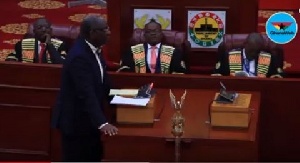 Former Energy Minister, Boakye Agyarko
Former Energy Minister, Boakye Agyarko
The natural state of politics in Ghana has become dramatic. Its most compelling actors, however competent, are becoming conceited. They strut the stage basking under the power atmosphere only to babble and veer into a euphoria rendering their services somewhat redundant.
These days, it appears the main challenge of government is not about achieving its developmental goals but how it can overcome the excessive drama of corrupt scandals brought about by its appointees. In fact, to talk about corruption in Ghana, or in Africa, without a look at the size of government’s appointees makes it superfluous.
Thomas Jefferson once said that a government big enough to give you everything you want, is big enough to take away everything you have. This aphorism expounds from Jean-Jacque Rousseau‘s concept of The Social Contract: when we surrender some of our freedom to the authority of government in exchange of protection of our rights. The relationship between government and the people is antithetical. Thus, as government power grows, the people’s power diminishes. Such that as the business of government hikes for wont of embezzlement, the people become poor.
In 2015, the current Minster of State in charge of Education stated that, “the President wields so much constitutional power, and is responsible for key appointments to several public offices. When such public appointees are cited for embezzlement and corruption and no machinery is set in motion for investigation, prosecution, or indictment, the president takes the final blame.”
Constitutional Power of the President
The Constitution provides, under articles 70(1) and 78(2), an executive powers of the President to appoint number of Ministers and other holders of public offices necessary for the efficient running of the State. And the Presidential Office Act (1993) does not place any limitation on Presidential staffers. They are discretionary. However, they are not arbitrary.
Article 297 provides a caveat. Traditionally, it’s called ‘implied power’. It states that, “the power to appoint a person to hold or to act in an office in the public service shall include the power to confirm appointments, to exercise disciplinary control over persons holding or acting in any such office and to remove the person from office”
The fact that the President has a discretionary power means that the people have some modicum of trust in him to administer justice on their behalf. It can be argued, from empirical analysis, that the size of government provides incentives for corruption, especially through campaign contributions from some political influences who want to receive their interests by appointments. The question is: must everyone be given appointments because they contributed to an election campaign?
Even though the Constitution mandates the President to appoint an unlimited number of Minister and officers into public offices, but by implied power, it ought to be judicious to sanction the number of appointees whose stated behaviours are wantonly prejudiced with corrupt scandals in a bid to safeguard the image of the Presidency; because nothing so far shows that the 110 Ministers of State and the 998 Presidential Staffers have been beneficial.
Surely, the account that the Minister of Energy unilaterally negotiated the Ameri novation deal worth over a billion dollars, without recourse to higher authority or any of his colleagues in government is fraudulent, and it has passed through the rigorous punishment removing the sector Minister earning the Presidency some vote of confidence.